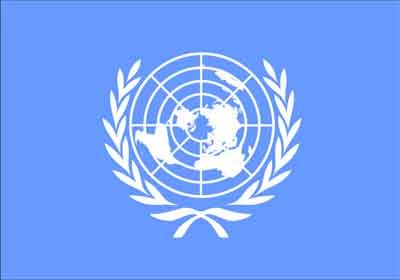 |
usa | world | animals | vocabulary | health | science | math | history |
United Nations

The United Nations, or UN, is an international organization established in 1945. The UN describes itself as a "global association of governments facilitating cooperation in international law, international security, economic development, and social equity." It was founded by 51 states and as of 2005 it consists of 191 member states, including virtually all internationally-recognized independent nations. From its headquarters in New York City, the member countries of the UN and its specialized agencies give guidance and make decisions on substantive and administrative issues in regular meetings held throughout each year.
The organization is structurally divided into administrative bodies, including the UN General Assembly, UN Security Council, UN Economic and Social Council, UN Trusteeship Council, UN Secretariat, and the International Court of Justice, as well as counterpart bodies dealing with the governance of all other UN system agencies, for example, the WHO and UNICEF. The organization's most visible public figure is the Secretary-General.
The term "United Nations" was coined by Franklin D. Roosevelt during World War II, to refer to the Allies. Its first formal use was in the January 1, 1942 Declaration by the United Nations, which committed the Allies to the principles of the Atlantic Charter and pledged them not to seek a separate peace with the Axis powers. Thereafter, the Allies used the term "United Nations Fighting Forces" to refer to their alliance.
The idea for the United Nations was elaborated in declarations signed at the wartime Allied conferences in Moscow, Cairo, and Tehran in 1943. From August to October 1944, representatives of France, the Republic of China, the United Kingdom, the United States, and the USSR met to elaborate the plans at the Dumbarton Oaks Estate in Washington, D.C. Those and later talks produced proposals outlining the purposes of the organization, its membership and organs, as well as arrangements to maintain international peace and security and international economic and social cooperation. These proposals were discussed and debated by governments and private citizens worldwide.
On April 25, 1945, the United Nations Conference on International Organizations began in San Francisco. In addition to the Governments, a number of non-government organizations, including Lions Clubs International were invited to assist in the drafting of the charter. The 50 nations represented at the conference signed the Charter of the United Nations two months later on June 26. Poland, which was not represented at the conference, but for which a place among the original signatories had been reserved, added its name later, bringing the total of original signatories to 51. The UN came into existence on October 24, 1945, after the Charter had been ratified by the five permanent members of the Security Council — Republic of China, France, the Soviet Union, United Kingdom, and the United States — and by a majority of the other 46 signatories.
Initially, the body was known as the United Nations Organization, or UNO. But by the 1950s, English speakers were referring to it as the United Nations, or UN.
UN membership is open to all peace-loving states that accept the obligations of the UN Charter and, in the judgement of the organization, are able and willing to fulfil these obligations. The General Assembly determines admission upon recommendation of the Security Council.
The United Nations is based on six principal organs, part of what is collectively called the United Nations System:
* UN General Assembly
* UN Security Council
* UN Economic and Social Council
* UN Trusteeship Council
* UN Secretariat
* International Court of Justice
The Security Council is in practice the most powerful decision-making body of the UN, as its resolutions are backed by the will of the most powerful members of the international community. However, this does not mean that its resolutions (e.g. international sanctions) are necessarily enforced, as the UN does not have its own means to do so. Even when economic sanctions are applied, their effectiveness (e.g. against Saddam Hussein's Iraq in the 1990s, or in abolishing apartheid in South Africa) is unclear.
The UN system is financed in two ways: assessed and voluntary contributions from member states. The regular two-year budgets of the UN and its specialized agencies are funded by assessments. In the case of the UN, the General Assembly approves the regular budget and determines the assessment for each member. This is broadly based on the relative capacity of each country to pay, as measured by national income statistics, along with other factors.
This article is licensed under the GNU Free Documentation License. It uses material from the Wikipedia article "United Nations".